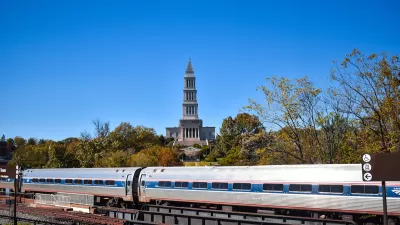Brendan Patrick Hughes examines what other cities can learn from the recently constructed Target Field.
By delivering on the kind of promises for infrastructure improvements that typically go unmet in publicly funded stadium projects, the $550 million Target Field has had a "transformative effect" on Minneapolis, writes Hughes. Light rail extensions, new bicycle lanes, an accompanying bike-share program, and nearby transit-oriented development are among the upgrades.
City officials are confident the stadium will have a lasting impact, Hughes says. He quotes Andrew Dahl, assistant to Minneapolis's economic development director:
"Transit, biking and pedestrian access to games and through the neighborhoods has soared. Restaurants and bars are bursting at the seams. A few accompanying policy changes have resulted in the city's first pedicabs and street food vendors. I think when we look back 10 or 20 years from now at what Minneapolis has become, this stadium will really be the definitive turning point."
FULL STORY: City Study: Minneapolis

Trump Administration Could Effectively End Housing Voucher Program
Federal officials are eyeing major cuts to the Section 8 program that helps millions of low-income households pay rent.

Planetizen Federal Action Tracker
A weekly monitor of how Trump’s orders and actions are impacting planners and planning in America.

The 120 Year Old Tiny Home Villages That Sheltered San Francisco’s Earthquake Refugees
More than a century ago, San Francisco mobilized to house thousands of residents displaced by the 1906 earthquake. Could their strategy offer a model for the present?

HSR Reaches Key Settlement in Northern California City
The state’s high-speed rail authority reached an agreement with Millbrae, a key city on the train’s proposed route to San Francisco.

Washington State Legislature Passes Parking Reform Bill
A bill that would limit parking requirements for new developments is headed to the governor’s desk.

Missouri Law Would Ban Protections for Housing Voucher Users
A state law seeks to overturn source-of-income discrimination bans passed by several Missouri cities.
Urban Design for Planners 1: Software Tools
This six-course series explores essential urban design concepts using open source software and equips planners with the tools they need to participate fully in the urban design process.
Planning for Universal Design
Learn the tools for implementing Universal Design in planning regulations.
Ada County Highway District
Clanton & Associates, Inc.
Jessamine County Fiscal Court
Institute for Housing and Urban Development Studies (IHS)
City of Grandview
Harvard GSD Executive Education
Toledo-Lucas County Plan Commissions
Salt Lake City
NYU Wagner Graduate School of Public Service




























